Rethink, repair and share
Freiburg, Aug 04, 2017
In July 2017, the Sustainability Center Freiburg and the Forschungsallianz Oberrhein, which researches the technical basics of sustainability, organized a summer school. This focused on the question of what the energy networks of the future should look like and how they can remain functional even during crises, for instance when attacked by hackers or during fuel shortages. PhD students from the partner universities met up to listen to lectures, attend workshops and discuss their projects. Sonja Seidel asked some of the participants about their research and how they contribute to sustainability in their private lives as well.

Photos: donatas1205, amenic181_540/beide Fotolia. Montage: Sandra Meyndt
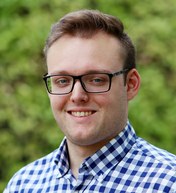 Mr Wallis, what are you researching on your project?
Mr Wallis, what are you researching on your project?
"My project looks at the IT security of Cloud Gateways. These are used in the technology of what we call the "Internet of Things", for instance when networking machines with an Internet-like structure. The Gateway is the interface between one or more companies and the Cloud, which is used to exchange the data. This is where my research into IT security comes in, because it is the last opportunity for the company to prevent prohibited data, such as trade secrets for example, being disclosed or data being transferred to the wrong recipient."
What does sustainability mean to you in your everyday life?
"Rethinking my own way of life, whether when I'm choosing between the car and public transport, or switching off unused equipment. In addition, you don't just have to change your mindset, you have to really live it to be an example to others. As Albert Einstein said, 'Setting an example is not the main means of influencing others, it is the only means.'"
Kevin Wallis, Computer Science, Hochschule Furtwangen University (HFU)
Photo: Christoph Breithaupt
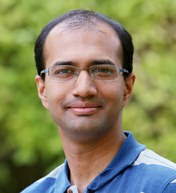 Mr Desai, what are you researching on your project?
Mr Desai, what are you researching on your project?
"I'm researching into the circuits of adsorption heat pumps and chillers that are used to heat and air-condition buildings. They use the warmth from the sun's radiation or the waste heat that arises from industrial and other processes as a source of energy. Thermally-stratified storage units which are used to recover heat can improve the performance of these heat pumps. The aim of my work is to understand the factors that influence the performance of these storage systems and heat pumps, and then to develop ways of controlling these factors. More efficient heat pumps could curb the emission of carbon dioxide."
What does sustainability mean to you in your everyday life?
"For me, sustainability means taking informed decisions, for example avoiding spontaneous spending and planning to buy things instead. It's economically and ecologically sustainable: I save money and avoid the waste that comes from buying unnecessary items."
Aditya Desai, Engineering, Karlsruhe Institute of Technology
Photo: Christoph Breithaupt
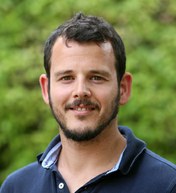 Mr Kraft, what are you researching on your project?
Mr Kraft, what are you researching on your project?
"We need new energy conversion technologies in order to guarantee a safe, economically attractive and environmentally sustainable supply of energy. Therefore I'm researching into heat pumps and chillers that are powered by waste heat. They're used in buildings, for example, to heat or air-condition them more efficiently. The aim of my research is to develop thermally-active structures and use them in what are called adsorption modules with a higher power density; this would reduce the use of materials and the size of this kind of heat pumps or chillers."
What does sustainability mean to you in your everyday life?
"I work ten hours a day on this project, so of course that results in a more sustainable way of life in private too."
Oliver Kraft, Engineering, Karlsruhe University of Applied Science
Photo: Christoph Breithaupt
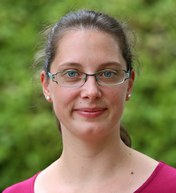 Ms Mohrmann, what are you researching on your project?
Ms Mohrmann, what are you researching on your project?
"I research natural fiber reinforced composite materials for their structure and their mechanical behavior. To do this, I study for example how they react if I put them under tension or how temperature and moisture influence the material. The production of natural fiber reinforced composite materials is far less of a strain for the necessary machines and is less hazardous to health. Furthermore the parts made are often better for recycling and disposal. My results could contribute to ordinary petroleum-based composite materials gradually being replaced with sustainable materials. They are already being used for many everyday items, and in future could also be used in the automobile or aviation industries."
What does sustainability mean to you in your everyday life?
"For me, sustainability means caring for my environment – considering where my food and clothing come from, and the conditions under which they are produced. It means preferably buying products less frequently and therefore better quality, and repairing things that get broken instead of throwing them away. As a whole I'd like to treat everything and everyone that I come into contact with mindfully."
Deborah Mohrmann, Biology, University of Freiburg
Photo: Christoph Breithaupt
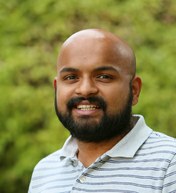 Mr Sawant, what are you researching on your project?
Mr Sawant, what are you researching on your project?
"I am working on 'trigeneration systems' that obtain electricity, heat and cooling from natural gas or fuel oil. The combined generation of three forms of energy from one source means that these systems have a better energy conversion ratio, produce fewer emissions and are very flexible. Plant like these will play an important part in sustainable energy networks in future."
What does sustainability mean to you in your everyday life?
"For me, sustainability means simply consuming less and sharing more."
Parantapa Sawant, Engineering, University of Applied Sciences Offenburg
Photo: Christoph Breithaupt
 Mr Groß, what are you researching on your project?
Mr Groß, what are you researching on your project?
"I'm developing a business strategy for domestic photovoltaic storage systems. They control when sustainably-generated electricity is stored in the battery and when it is fed into the network, and predict the output generated. This ensures that as much photovoltaic electricity as possible is used, but at the same time that there's no additional strain on the distribution networks. My research indicates that owners can profit from such domestic storage systems, because control of the systems is improved in relation to the electricity tariff. And the need for non-renewably-generated electricity is reduced too."
What does sustainability mean to you in your everyday life?
"Unfortunately I believe an individual can contribute little to sustainability. Cycling and a careful choice of diet can help, but definitely make little difference globally."
Arne Groß, Physics, Fraunhofer Institute for Solar Energy Systems ISE
Photo: Christoph Breithaupt
Sustainability Center Freiburg
http://www.leistungszentrum-nachhaltigkeit.de/en
Press Release on Forschungsallianz Oberrhein (in German)
www.pr.uni-freiburg.de/pm/2017/pm.2017-02-02.15

